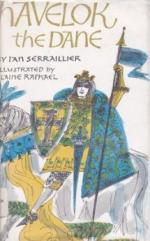“Let us see,” quoth Havelok, laughing; and with that he put him gently into it, and lifted him into the air, and on to his mighty shoulder, carrying him easily, and setting him down in safety.
The basket maker was cross at first, but none was able to be angry with Havelok long, and he too began to smile.
“It is ‘curan’ that you are, master,” he said; “not even Arthur himself could have done that.”
“Many times have I heard your folk call me that. I would learn what it means,” said Havelok.
But the old man could hardly find the English word for the name, which means “a wonder,” and nothing more. Nevertheless the marsh folk were wont to call their friend “Hablok Curan” in their talk, for a wonder he was to all who knew him.
So he came home with his great basket, and said, “Here sit I by the fire, eating more than my share, and helping to win it not at all. Now will I make amends, for I will go the fisher’s rounds through the marshlands with my basket, and I think that I shall do well.”
Now my father tried to prevent him doing this, because, as I know now, it was not work for a king’s son. But Havelok would not be denied.
“Fat and idle am I, and my muscles need hardening,” he said. “Let me go, father, for I was restless at home.”
So from that time he went out into the marshland far and wide, and the people grew to know and love him well. Always he came back with his fish sold, and gave money and full account to my father, and mostly the account would end thus:
“Four fish also there were more, but the burden was heavy, and so I even gave them to a certain old dame.”
And my mother would say, “It is likely that the burden was lighter for her blessing.”
And, truly, if the love of poor folk did help, Havelok’s burden weighed naught, great though it was.
Yet we thought little of the blessings of the Welsh folk of the marsh in those days, for they blessed not in the names of the Asir, being sons of the British Christians of long ago, and many, as I think, Christians yet. Witlaf and all the English folk were Odin’s men, as we were, having a temple at the place called Thor’s Way, among the hills. But we had naught to do with the faith of the thralls, which was not our business. Only Withelm was curious in the matter, and was wont to ask them thereof at times, though at first they feared to tell him anything, seeing how the Saxons and English had treated the Christian folk at their first coming. But that was forgotten now, by the English at least, and times were quiet for these poor folk. There was a wise man, too, of their faith, who lived in the wild hills not far from the city, and they were wont to go to him for advice if they needed it. They said also that the king of Lindsey had once been a Christian, for he was Welsh by birth on his mother’s side, and had been so brought up. It is certain that his sister Orwenna, who married Ethelwald of East Anglia, was one, but I have seen Alsi the king at the feasts of the Asir at Thor’s Way when Yuletide was kept, so it is not so certain about him. He had many Welsh nobles about him at the court, kinsmen of his mother mostly, so that it did not seem strange, though there is not much love lost between the English and the folk whom they conquered, as one might suppose.




